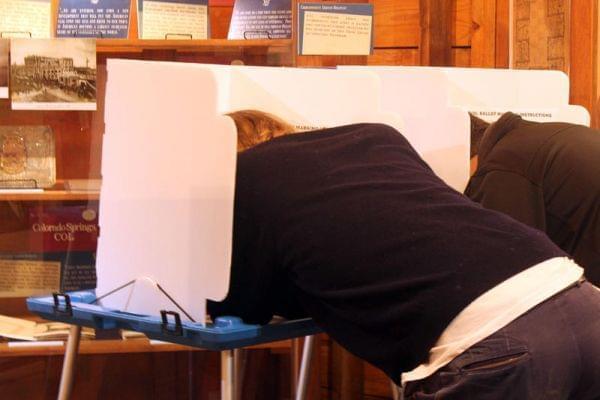Midwest Voters Weigh In On Pot, The ACA And More

Voters cast ballots in Indianapolis. Lauren Chapman/Indiana Public Broadcasting News
Health care was a big campaign issue across the Midwest, and Tuesday's election results were mixed. Among the winners: medical marijuana.
Many Democratic candidates charged that Republican opponents wanted to gut the Affordable Care Act, including protections for people with pre-existing conditions. But Republicans such as Mike Braun, who won the U.S. Senate race in Indiana, fought off that characterization.
Drugs were another big issue — from decriminalizing possession to legalizing medical marijuana.
In Ohio, a measure to relax criminal penalties for drug possession was soundly defeated — as was one of its supporters, Democratic gubernatorial candidate Richard Cordray.
In Missouri, voters legalized marijuana for medical purposes. There are now 32 states that allow pot to be used as a medical treatment. (Voters also legalized recreational marijuana in Michigan, the first state in the Midwest to approve that.)
Affordable Care Act
Health care was a key issue in the hotly contested race for the U.S. House seat representing Illinois’ 13th Congressional District in central Illinois. In a race that attracted national interest and millions of dollars in out-of-state money, Rep. Rodney Davis, a three-term Republican, won with 51 percent of the vote, defeating Democrat Betsy Dirksen Londrigan.
Leading up to the election, Londrigan accused Davis of voting numerous times to eliminate Affordable Care Act protections for people with pre-existing conditions. Davis said the GOP House plan he backed in 2017 had layers of protection for people with pre-existing conditions.
Indeed, a line in the 2017 American Health Care Act, the failed GOP-led effort to repeal and replace the ACA, states: “Nothing in this Act shall be construed as permitting health insurance issuers to limit access to health coverage for individuals with preexisting conditions.”
However, the most recent GOP bill to dramatically overhaul the ACA would have given states the authority to allow insurers to waive certain protections of pre-existing conditions, “including the one requiring the same premiums be charged regardless of health status.”
Congressional Budget Office analysis found that if states took advantage of those waivers, the insurance markets could blow up, leading to such high costs that people with pre-existing conditions would be unable to obtain coverage.
The issue also was a focus of the U.S. Senate race in Indiana, where Braun unseated incumbent Sen. Joe Donnelly with nearly 53 percent of the vote.
Donnelly, a Democrat, said during the campaign that some people could lose coverage for pre-existing conditions if the ACA is overturned with no replacement. He took aim at Braun and a lawsuit that challenges the federal health law.
Braun responded by saying he has “real life experience” negotiating health care coverage as an employer.
Braun’s win could have significant implications for the future of the federal health law. When Senate Republicans attempted to repeal parts of the ACA over the summer, Donnelly voted along party lines, helping provide the slim 49-51 victory for Democrats. He also voted with Democrats last month to eliminate short-term health care plans that don't cover pre-existing conditions, a measure that didn’t succeed.
In campaign materials, Braun called Obamacare an “unmitigated disaster” and said he would support allowing individuals to purchase insurance across state lines and small businesses to pool resources to purchase insurance.
Drugs
Missouri joined 31 other states and Washington, D.C., in legalizing medical marijuana. (Utah voters approved a similar initative Tuesday.)
The winning measure, which passed overwhelmingly, would impose a 4 percent tax on marijuana sales.
“In becoming the 31st state to allow doctors to recommend medical marijuana to patients with serious and debilitating illnesses, Missourians showed that increasing health care treatment options for patients and supporting veterans are bipartisan Missouri values," Amendment 2 spokesman Jack Cardetti told St. Louis Public Radio.
Several Missouri medical societies had opposed the ballot measures, expressing concern over the health risks associated with marijuana use and the lack of evidence in best prescribing practices.
Meanwhile in Ohio, voters overwhelmingly defeated a statewide initiative that would have reduced penalties for obtaining, possessing and using illegal drugs. About two-thirds of voters opposed the measure.
The ballot initiative called for reducing drug possession to a misdemeanor, and prohibiting jail time. The state said it would save money by having fewer people behind bars, and would channel those funds to rehabilitation programs and crime victims.
Supporters said that non-violent drug offenders should be directed towards treatment instead of jail.
Many Republicans — as well as Ohio’s Coroners Association and Bar Association — opposed the initiative, saying it would weaken the power of law enforcement and make it harder for prosecutors to get people into treatment.
This story was produced by Side Effects Public Media, a news collaborative covering public health.

